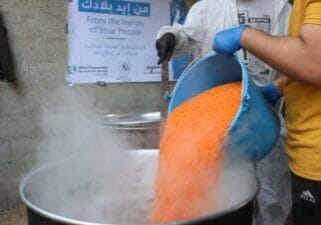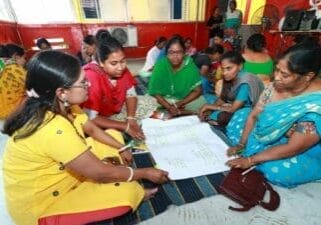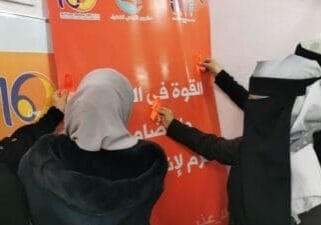News > Blog
Pass the Mic: Reinvigorating Global Efforts to Reduce Maternal and Child Mortality
Published 04/20/2023 by Global Communities

By Paula Rudnicka, Sr. Manager for Public Affairs at Global Communities
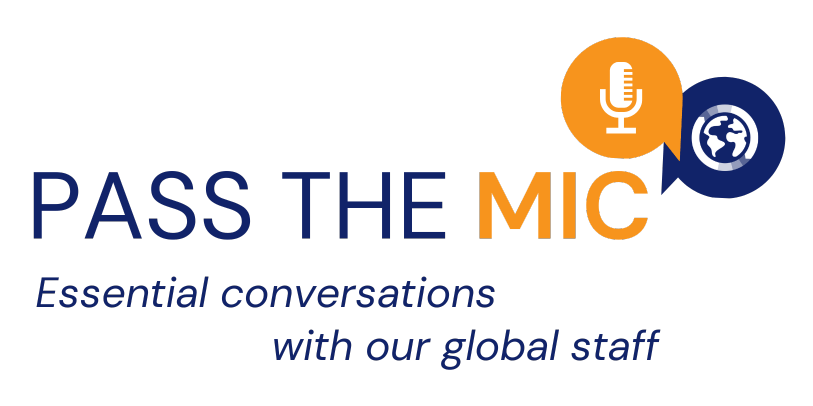 In 2012, the United States Agency for International Development (USAID) partnered with the United Nations Children’s Fund (UNICEF) and the Governments of India and Ethiopia to convene the Child Survival Call to Action, which galvanized unprecedented commitments from governments and civil society around the world to end preventable maternal and child deaths. Three years later, UN Member States adopted the Agenda for Sustainable Development with ambitious targets to reduce the global maternal mortality ratio to less than 70 per 100,000 live births by 2030 and end preventable deaths of newborns and children under 5 years of age, also by 2030. Yet every two minutes a woman dies due to pregnancy or childbirth, and most of these deaths are entirely preventable.
In 2012, the United States Agency for International Development (USAID) partnered with the United Nations Children’s Fund (UNICEF) and the Governments of India and Ethiopia to convene the Child Survival Call to Action, which galvanized unprecedented commitments from governments and civil society around the world to end preventable maternal and child deaths. Three years later, UN Member States adopted the Agenda for Sustainable Development with ambitious targets to reduce the global maternal mortality ratio to less than 70 per 100,000 live births by 2030 and end preventable deaths of newborns and children under 5 years of age, also by 2030. Yet every two minutes a woman dies due to pregnancy or childbirth, and most of these deaths are entirely preventable.
New data released this February by several UN agencies shows significant progress in reducing maternal deaths between 2000 and 2015, but also reveals alarming setbacks for maternal health over recent years. According to the report, “The world must significantly accelerate progress to meet global targets for reducing maternal deaths, or else risk the lives of over 1 million more women by 2030.”
I recently chatted with Cara Endyke Doran, our Senior Director of Health, WASH and Nutrition, about these trends and about ways in which Global Communities is saving mothers’ and children’s lives.
This is the first conversation in our new series “Pass the Mic,” where staff from Global Communities share innovative ideas and in-depth insights on timely topics spanning the development, humanitarian and peace nexus. The interview was edited for length and clarity.

Paula: You recently traveled from Boston to Washington, D.C., to attend the global event Maternal and Child Survival: A Decade of Progress and Action for the Future, co-convened by USAID, UNICEF and the Governments of India, Senegal and the United Kingdom. A Hill Reception organized by the Global Health Council and co-sponsored by Global Communities followed. Why were these convenings important to you and what was your key takeaway?
![]()
Cara: These events were important because they provided an opportunity for global leaders, health experts, advocates and practitioners to come together to review progress made in maternal and child health since 2012 and to chart a course for future action. Despite significant improvements toward reducing maternal, newborn and child deaths since 2012, many populations around the globe do not have equitable access to high-quality care. Even when care is available and of quality, women and children still do not have access to and control over resources to attain a high standard of health and well-being. Furthermore, many health systems lack the ability to adapt to changing epidemiologic and demographic trends. During the event, USAID addressed these continued challenges and released a new strategic framework for preventing maternal and child deaths by 2030. The framework laid out a plan for improving maternal, newborn and child health outcomes through a renewed focus on coverage, quality and equity.
Paula: While there were calls for a celebration, most experts acknowledged dramatic setbacks caused by the COVID-19 pandemic, ongoing conflicts and natural disasters. For example, Dr. Atul Gawande, Assistant Administrator at USAID, pointed out the first drop in life expectancy since World War II. What is needed to rebuild the momentum and get back on track for achieving related Sustainable Development Goals by 2030?
![]()
Cara: Lessons from Ebola and other emergencies have taught us that women and children are often the first to suffer in a crisis. The impact of the COVID-19 pandemic on women and children is no different. Widespread disruptions in health services have impacted women’s access to lifesaving maternal health services, such as treatment for postpartum hemorrhage, infection and high blood pressure. These disruptions have also impacted children. For example, we saw major backsliding in childhood immunizations, leaving millions of children at increased risk of contracting vaccine-preventable diseases. Children have also been at risk of malnutrition due to disrupted food systems and decreased access to essential nutrition services.
At Global Communities, we understand the critical need to advocate for and maintain essential services in an emergency to avoid preventable mortality as well as improve data access and quality to support timely decision-making. We aim to reinforce stronger, more resilient and adaptable health systems that put the needs of women, children and other vulnerable people at the center of programming. This includes holistic, locally led programs that support sustained political will, adequate investment and financing of health systems. We also believe in the power of equitable partnerships and multisectoral approaches to address health and well-being. Ensuring meaningful participation of women and overlooked groups in the design and implantation of programs is of key importance. So is accountability to the people we serve.
Paula: The speakers consistently mentioned the need to invest in primary healthcare and integrated services for moms and babies. In fact, some talked about a radical reorientation of health systems towards primary health. What is your perspective on this issue? Is Global Communities well-positioned to support this effort?
![]()
Cara: Global Communities advances opportunity, well-being and resilience among vulnerable groups and across all ages. We believe that maternal and child health services are most effective when they are integrated across the continuum of care for mothers, newborns and children. We work with local health structures to bundle services within existing platforms, especially primary healthcare, to improve access, address multiple health needs at once and increase cost-efficiency. Our approaches are locally driven and grounded in systems-thinking, gender equality, social inclusion, evidence and ingenuity.
With our community-driven systems approaches, we are optimally placed to strengthen primary healthcare systems to improve maternal and child health. By involving community members in the planning, implementation and evaluation of primary healthcare projects, we can ensure that the healthcare services are tailored to the specific needs of the community. By leveraging the local knowledge and tapping into the existing networks and resources within the community, we can increase the effectiveness and sustainability of primary healthcare projects. And by making an effort to understand local contexts and include community members in the decision-making process, we can build trust and relationships between healthcare providers and community members. Through our partnerships with communities, we can ensure that the delivery of high-quality healthcare services can continue even after external funding ends.
Paula: I very much appreciated the focus on equity during the event. Dr. Omar Abdi from UNICEF remarked that 10 years ago equity was an ‘innovation’ in the maternal and child health space, but now everyone is talking about it. The speakers emphasized the importance of using equity data to understand who is left behind and then ensuring that health interventions reach the poorest and most marginalized populations. Advancing equity is one of the cornerstones of Global Communities’ mission. What tools and approaches do we use to promote equitable and gender-responsive access to health services?
![]()
Cara: Global Communities uses a multipronged approach to ensure equitable and gender-responsive programs. Where appropriate, we start our programs with gender analyses that examine how gender roles, norms and relations affect access to health services and health outcomes. These analyses help us identify barriers and opportunities for addressing gender disparities and improving women’s and children’s access to care. We also embed metrics to assess health equity in our data systems. This involves tracking health outcomes and health service utilization by gender and other social determinants of health to identify gaps and monitor progress toward health equity.

Paula: At the event USAID Administrator Samantha Power launched a new strategy, Preventing Child and Maternal Deaths: A Framework for Action in a Changing World. The strategy lays out an action plan to improve health outcomes for women and children by 2030. What is your vision for Global Communities’ maternal and child health programming in the next 5-10 years?
![]()
Cara: Over the next five years, I hope to strengthen and expand our ability to support primary health systems to be able to protect women, children and adolescents in a world affected by climate change. The goal is to ensure that people we serve have access to quality health services and can achieve the highest possible level of health and well-being. That children not only survive but thrive, and that we transform systems to meet their needs. And that health systems are well-managed with the ability to adapt and respond to changing needs of the community, including in times of crisis.
Paula: Climate change and its impact on maternal and child health were also mentioned by multiple speakers. Youare representing Global Communities as a co-chair of the USAID-funded Child Health Task Force, which is exploring this issue. Can you share a few thoughts on this subject?
![]()
Cara: Through the Child Health Task Force we are unpacking the effects that changing climate has on children and exploring system-level approaches that health systems can take to adapt to changing conditions. According to the Children’s Climate Risk Index, climate change is already significantly affecting children globally, with approximately 1 billion children at ‘extremely high risk’ of experiencing the negative impacts of climate change. While research and literature linking climate change and environmental degradation to ecological and social outcomes have been rapidly proliferating, there is a noticeable lack of data on the intersection of climate, environment and health. We seek to address this information gap through a webinar series “Adapting Health Systems to Protect Children from the Impact of Climate Change.” These events foster greater discussion on under-represented but important child health themes. Please join the series here. We also promote collaboration across sectors and organizations to advocate for greater global investment in adapting child health systems to become more resilient in the face of climate change going forward.

Paula: Global Communities has worked to save mothers’ and children’s lives and improve their health and well-being for six decades. What is, in your opinion, our greatest contribution or achievement thus far? What are you most proud of?
![]()
Cara: One of the hallmarks of Global Communities’ approach is training and mentoring community health workers (CHW) to deliver high-quality maternal and child health services. We work to ensure that these frontline health workers are motivated and equipped with knowledge and skills to employ global best practices, such as kangaroo mother care, community-based management of acute malnutrition and emergency obstetric and newborn care. It is very exciting and rewarding work. My colleagues and I recently published a paper in the Journal of Social Science and Medicine titled “Effects of Engaging Fathers and Bundling Nutrition and Parenting Interventions on Household Gender Equality and Women’s Empowerment in Rural Tanzania.” EFFECTS was a cluster-randomized controlled trial co-designed and implemented by Global Communities. The study generated novel evidence that, with the right approach and resources, CHWs can deliver gender-transformative nutrition and parenting interventions to couples in low-resource community settings with potentially synergistic positive effects on household gender relations and maternal and child well-being.
Paula: Very exciting, congratulations! Empowering CHWs is so important. This was also a recurring theme of the events we talked about. One speaker, Millicent Miruka — a CHW Supervisor from Kenya — made an impassioned plea to recognize CHWs’ contributions, listen to their voices and ensure they are well-trained and supervised. I am also proud we are doing this work.
Thank you for your time! How can our readers reach you to learn more?
![]()
Cara: To learn more about Global Communities’ work in promoting maternal and child health please visit our website and read our most recent technical factsheet. If you have questions about our programs, please email us at [email protected]. You can also find me on LinkedIn.
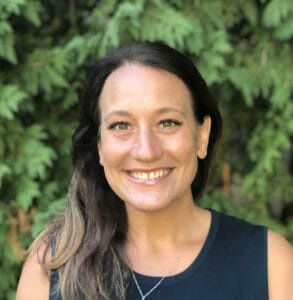
Cara Endyke-Doran
Senior Director, Health, Nutrition & WASH
Cara Endyke-Doran, MPH, MSN, RN, is an advanced practice nurse with nearly 25 years of experience leading large international health programs focused on women’s, children’s, and adolescent’s health. Her technical areas of expertise include maternal, newborn, child and adolescent health, gender, and HIV prevention, care, and treatment. She is a thought leader who sits on global task forces and advisory groups. Cara is an innovative and effective problem-solver who adapts and responds to evolving program needs. She has held long-term assignments in Mozambique, Zambia, and Nicaragua and provided technical support to programs in Guatemala, Haiti, Honduras, India, Kenya, Liberia, Malawi, Tanzania, Uganda, and South Africa. She has her master’s degrees in Public Health and Nursing from Johns Hopkins University. She speaks Spanish and Portuguese.

Global Communities is home to a diverse team of professionals with a broad range of expertise and perspectives that help us build the world we envision: one of expanded opportunity, where crises give way to resilience and all people thrive. In our new “Pass the Mic” series, our global staff share innovative ideas and in-depth insights on timely topics spanning the development, humanitarian and peace nexus. Learn how our colleagues are co-creating a more just, prosperous and equitable global community.


